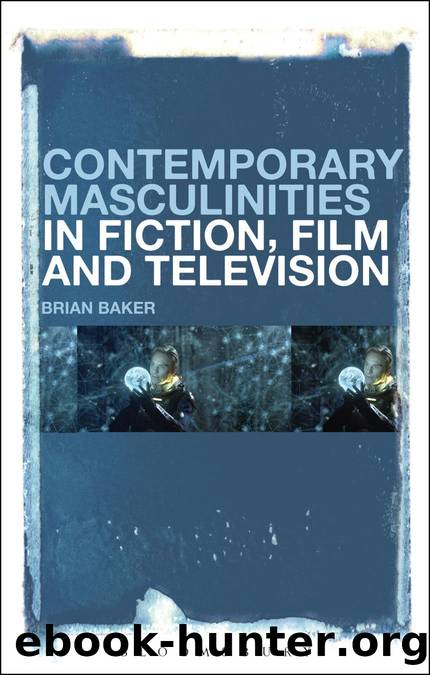Contemporary Masculinities in Fiction, Film and Television by Baker Brian;

Author:Baker, Brian;
Language: eng
Format: epub
Publisher: Bloomsbury Academic & Professional
Published: 2019-11-23T16:00:00+00:00
Alien Nations
This return of the alien Other (and problematics of âcontactâ) from the spatial margins to the centre, a recurrent motif in contemporary science fiction cinema, is foreshadowed by the 1988 film Alien Nation. The film is, in essence, a 1980sâ buddyâcop movie, but which shifts the racial dynamic of Lethal Weapon (1986) or, much earlier, Dirty Harry (1971) into a science fiction scenario wherein one of the two male cops investigating a crime is of alien origin: a âNewcomerâ. This begins with a provocative interest in media representations that the film does not follow-up; as in Monsters, television footage is inserted directly into the fabric of film. Grainy images of a large disc-shaped ship floating over the Mojave desert are taken from a purported news report, which explains that in 1991, âa slave ship washed ashore on Earthâ; footage of Ronald Reagan (who had, by 1991, been out of office for 3 years, but who would still have been president at the time of the filmâs production) is repurposed to make it seem as though he is proactive in accepting the Newcomers into American society. The film sets up the United States as a space wherein immigrants are welcomed and are allowed to make their own lives; but as the Newcomer Detective Francisco (Mandy Patinkin) says later in the film, Americans rarely live up to the ideals enshrined in its own Constitution.
The first sequence begins with Detective Matt Sykes (James Caan) and his African-American partner Tuggle (Roger Aaron Brown) cruising the part of Los Angeles, âNew Downtownâ, which has become a centre for the Newcomer community. Caanâs expressed dislike for the Newcomers is played off the affection he has for his black colleague; the scene is an almost direct reprise of a scene in Dirty Harry, where Inspector Callahan (Clint Eastwood) drives around Haight-Ashbury with his new colleague Chico Gonzalez (Reni Santoni) expressing his disgust for the permissive attitudes of the young and wishing to âthrow a net over the whole bunch of themâ, to which Gonzalez replies, âI know what you mean.â Just as in Dirty Harry, in Alien Nation, the racial attitudes inhabited by the aggressive, white, middle-aged cop protagonist are deliberately softened by a homosocial relationship with a partner coded as ethnically non-white (African-American or Chicano); in Alien Nation, when Tuggle is shot and killed during a robbery of a Mom-and-Pop grocery store in the Newcomer district, Sykes agrees to accept Detective Francisco (recently promoted from the uniformed division) in order to track down the perpetrators. The learning experience that is central to the buddy-movie dynamic here gains traction through the absolute centrality of coming to understand the Other in Alien Nationâs science fiction scenario. The fact that the Newcomers bear the burden of a history of slavery makes the racial analogy explicit, but the film is much less directly interested in exploring these issues than Blade Runner (1982) or, more overtly still, Philip K. Dickâs novel from which Blade Runner was developed, Do Androids Dream of Electric Sheep? (1968).
Download
This site does not store any files on its server. We only index and link to content provided by other sites. Please contact the content providers to delete copyright contents if any and email us, we'll remove relevant links or contents immediately.
Call Me by Your Name by André Aciman(19904)
Ready Player One by Cline Ernest(13992)
How to Be a Bawse: A Guide to Conquering Life by Lilly Singh(7156)
Wiseguy by Nicholas Pileggi(5319)
The Kite Runner by Khaled Hosseini(4952)
On Writing A Memoir of the Craft by Stephen King(4664)
Audition by Ryu Murakami(4616)
The Crown by Robert Lacey(4572)
Call me by your name by Andre Aciman(4463)
Gerald's Game by Stephen King(4376)
Harry Potter and the Cursed Child: The Journey by Harry Potter Theatrical Productions(4314)
Dialogue by Robert McKee(4160)
The Perils of Being Moderately Famous by Soha Ali Khan(4064)
Dynamic Alignment Through Imagery by Eric Franklin(3920)
Apollo 8 by Jeffrey Kluger(3512)
How to be Champion: My Autobiography by Sarah Millican(3493)
The Inner Game of Tennis by W. Timothy Gallwey(3472)
Seriously... I'm Kidding by Ellen DeGeneres(3412)
Darker by E L James(3407)
